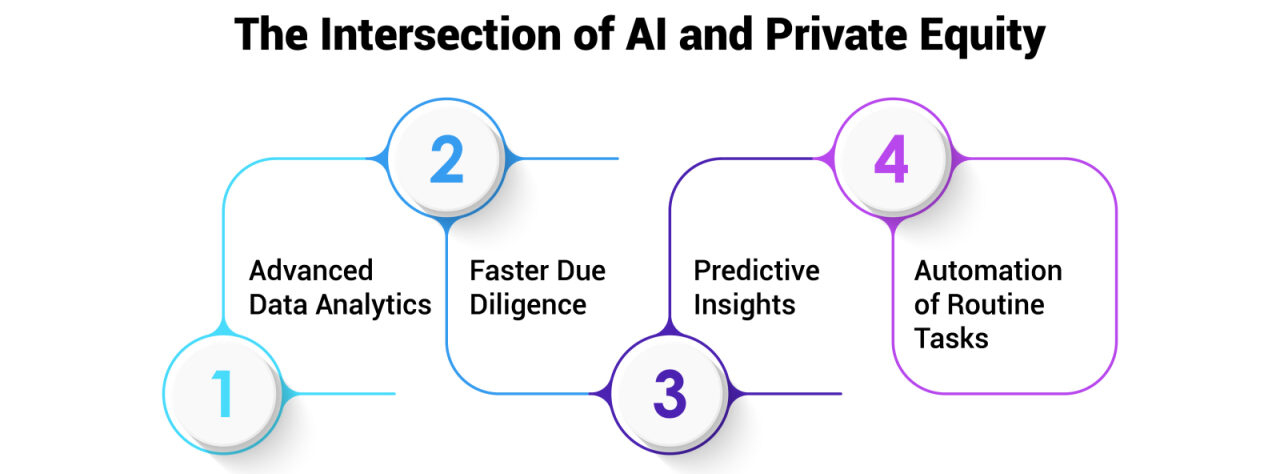Introduction
Key Notes:
-
How AI revolutionizes the operations of private equity firms.
-
Portfolio innovations using advanced technology.
-
Risk management, operational efficiency, and investment strategy insights.
Private equity firms find themselves living in an increasingly complex world and the evolution of what can be done with AI is having profound implications across the front, middle, and back offices. This article discusses how AI helps in portfolio management, makes due diligence quicker, and redefines risk management with compelling case studies and foresight into what lies ahead for firms to maintain a competitive edge to thrive in a competitive market.
The Intersection of AI and Private Equity: Driving Innovation in Deal-Making
AI in private equity is changing the game when it comes to how firms are evaluating, managing, and growing their portfolios. These holes are filled by integrating data and integrating AI, thereby transforming traditional, manual processes into data-driven ones, driven by AI, and this enables private equity firms to make far more efficient decisions.

Key transformations include:
-
Advanced Data Analytics: With AI, firms can look at a ton of data, quickly, to discover patterns and trends that would otherwise be lost in the noise.
-
Faster Due Diligence: The due diligence process simplified by the use of machine learning algorithms minimizes investment evaluation time.
-
Predictive Insights: A forecast of future market trends is achieved via AI so that firms can always lead the competition.
-
Automation of Routine Tasks: Tasks like financial modeling and risk assessment are repetitive and automated, therefore, giving employees free hours to make more strategic decisions.
Firms use private equity technology to enable their firms to become industry leaders, to use technology to create tomorrow’s deals, and to empower themselves to edge the competition.
Smarter Due Diligence: How AI is Supercharging Decision-Making
Private equity technology deployed in today’s fast-moving investment environment is using AI to revolutionize a traditional laborious and complex due diligence process. Private equity firms are quickly analyzing enormous amounts of data using AI to make more accurate investment decisions, quicker.
AI tools enhance due diligence by:
-
Data Analytics: AI analyze and process data from different areas – from financial reports to market trends, and customer reviews, to share a deeper understanding of a potential investment’s strong and weak points.
-
Speed and Accuracy: AI-driven systems cut this time down from weeks or months, and also whereas more traditional due diligence systems yield less accurate outcomes in data analysis.
-
Risk Assessment: AI detects risks early by looking at past data and determining what will happen in future markets, which assists companies in making proactive shifts.
AI increasingly enhances the due diligence outcome from which private equity firms base their investment decisions, lower the risk, and strategically allocate their assets. Portfolio management has now set new standards in what is now attainable with AI.
Operational Excellence: Boosting Portfolio Companies with AI
In an era of competitiveness, private equity firms are now using AI to help increase operational efficiency in their portfolio companies. Through the use of the latest advanced analytics and machine learning, these firms can identify latent inefficiencies that may impact performance.
The use of AI technologies allows us to identify operational gaps and streamline processes allowing us to correctly allocate resources.
Key benefits of utilizing AI for operational excellence include:
-
Detecting Inefficiencies: Firms can now implement targeted improvements based on AI tools which analyze vast amounts of operational data to pinpoint areas of waste and inefficiency.
-
Predictive Intelligence: Private equity firms can use predictive modeling to predict needs and make data-driven decisions that ultimately improve resource management and operational agility.
-
Real-World Impact: AI-driven insights for many of their portfolio companies have flourished. For instance, firms are also saying that they have reduced operational costs and improved service delivery time, consequently translating into a direct impact on profitability.
Private equity's growing use of AI is not merely increasing efficiency, but creating value across the portfolio through an emphasis on operational excellence. By taking this strategic approach, firms position themselves to compete effectively in a changing market and achieve the best possible returns for investors and stakeholders alike.
Proactive Risk Management: Leveraging AI to Navigate Market Volatility
Risk management is central to private equity, and AI is increasingly becoming a crucial element in risk management strategies. AI can be described as efficient since it enhances real-time chance evaluation that assists firms in avoiding certain losses.
-
Real-time Risk Assessment: Sophisticated techniques process large amounts of information and find new threats and opportunities enabling firms to act fast in response to changes in the market environment.
-
Forecasting the Future: Market forecast is another field, where AI models can successfully operate predictions based on historical trends, allowing firms to be ready for market changes before they happen.
-
Lessons Learned: Multiple private equity firms today have managed to implement AI for risk mitigation, reporting enhanced results through the management of risks.
AI helps private equity firms protect investment capture opportunities for improved performance and hedge against risk by integrating AI into existing risk management strategies.
Strategic Capital Allocation: Harnessing AI for Intelligent Investment Decisions
AI is used by private equity firms in today’s competitive market to informally improve their capital allocation strategies and make that data meaningful. Such an approach based on data allows firms to make strategic investment decisions based on data.
AI plays a crucial role in refining investment strategies through several key mechanisms:
-
Turning Data into Strategy: AI algorithms, through analyzing massive amounts of market data, can detect patterns and trends that traditional methods may lack. This allows firms to identify high-potential investment opportunities.
-
Adaptive Models: AI Systems adapt their investment strategies in real-time to market changes or changes to investor sentiment. There is the associated adaptability that strengthens the agility of making decisions.
-
Success Stories: Several private equity firms have incorporated AI, helping them change their investment approaches to get better returns and increase their control of risks.
Embracing advancement in private equity technology will not only help firms enhance their portfolio management but also allow your firm to remain at the forefront of the ever-changing market. AI is no longer a luxury that can be bolted on to private equity, it is a necessity if private equity is to continue being successful.
Breaking Down Barriers: Challenges in AI Adoption for Private Equity Firms
Despite the clear advantages that AI can provide for portfolio management, many private equity firms still need help to fully embrace these technologies. Knowing these is key to implementing effectively.
-
Implementation Complexity: Firms hesitate to adapt to AI mainly because of the technical intricacies of AI systems. Many don’t have the required infrastructure to provide the base for sophisticated AI technologies.
-
Data Integrity: High-quality relevant data is essential for good AI outcomes. Inconsistency in data sources for firms is a relatively common challenge and often leads to poor analyses and decision-making.
-
Cultural Resistance: Refusal to abandon traditional practices can stifle innovation. For instance, employees may feel reluctant to adopt AI tools due to the fear of losing their jobs or a lack of familiarity with such technologies.
Solving these barriers will require private equity firms to invest in training, give data governance the priority it deserves, and establish a culture in which technological innovation is embraced. Firms can directly resolve these challenges to untangle the full potential of AI to spur growth and competitive advantage.
Conclusion
Private equity is being revolutionized by AI, from due diligence to risk management, to operational efficiency. Private equity technology is increasingly being altered by AI which is also offering smarter portfolio management and the firms embracing this new evolution in technology will have a competitive advantage. Private equity firms need to anticipate the future and invest in AI-driven solutions & future-proof portfolios to outshine their competitors and gain meaningful, data-driven insights for sustainable growth and long-term success.








